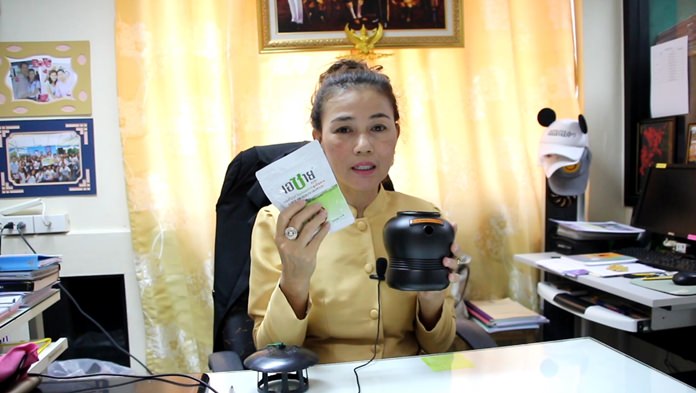
Pattaya will begin distributing an award-winning mosquito-trap to try and bring the city’s stubborn dengue fever-infection rate down.
 Disease control chief Kanrapa Mukdasanit said July 4 that schools, temples and community offices would begin testing the LeO-Trap, a modified mosquito trap developed by the Health Ministry’s Department of Medical Sciences.
Disease control chief Kanrapa Mukdasanit said July 4 that schools, temples and community offices would begin testing the LeO-Trap, a modified mosquito trap developed by the Health Ministry’s Department of Medical Sciences.
The device, which lures mosquitos to lay their eggs inside and then kills the bugs when they hatch, won the Platinum award at the National Research Center’s Platinum National Research Award.
Users add about 2.5 centimeters of water to a black box with a hole in the back, and then a quarter teaspoon of Zeolite pesticide. Users then close the lid and place it in a spot where mosquitos tend to breed, such as dark spots, under a clothesline, in a bathroom or bushes. Mosquitos fly into the hole in the box and lay eggs in the water.
When the eggs hatch in one or two days, they are poisoned by the Zerolite and die within hours.
Advocates say the box is small and inconspicuous and easy to maintain, with water added periodically and Zeolite only every three months.
The box has been shown to reduce mosquito populations in the areas around them.
The schools and temples will test the effectiveness of the device and the Public Health Department will monitor the rate of dengue infections in Pattaya. If the devices are shown to be effective, they will be distributed widely with every house advised to have one inside and one outside.
Health officials said the new traps are necessary as Pattaya’s anti-dengue campaign – which has included frequent pesticide sprayings, distribution of abate and concerted educational efforts – has failed to reduce the number of new dengue cases reported.





